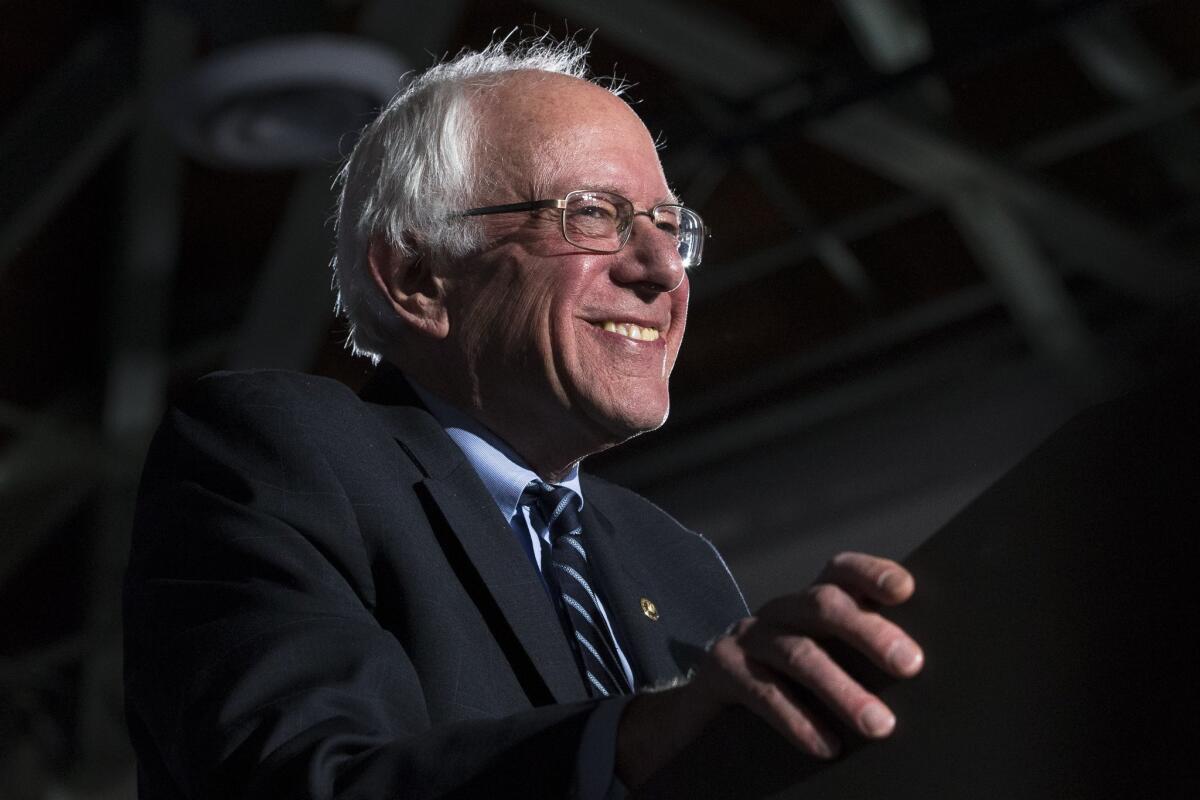Op-Ed: A Jewish candidate won a U.S. presidential primary for the first time. And America yawned.

Democratic presidential candidate Sen. Bernie Sanders smiles before he speaks during a primary night watch party at Concord High School in Concord, N.H. on Feb. 9.
- Share via
For the first time in American history, a Jewish candidate won a presidential primary election. And America yawned.
I’m talking about Bernie Sanders, of course, who thumped Hillary Clinton in New Hampshire’s Democratic contest on Tuesday. Everyone is aware that Clinton would be our first female president, but most voters don’t seem to know — or care — that Sanders would be our first Jewish one.
That’s partly because Clinton plays up the first-woman deal, while Sanders downplays his Judaism. He has never belonged to a synagogue, his wife isn’t Jewish, and he hasn’t been to Israel since a volunteer stint on a kibbutz in the early 1960s.
Perhaps we can’t see what a big deal Sanders’ candidacy truly is because we’ve forgotten how much prejudice Jews encountered for most of our political history.
But there’s more to the story of our collective insouciance. Perhaps we can’t see what a big deal Sanders’ candidacy truly is because we’ve forgotten how much prejudice Jews encountered for most of our political history.
Consider the most prominent Jewish politician of the early 1800s, Mordecai Noah, who served as sheriff of New York City and also as U.S. consul to Tunis. Although Noah’s father and grandfather had both fought in the American Revolution, newspapers routinely referred to him as “Shylock” or simply “the Jew,” to remind readers that he really didn’t belong.
And when Noah defended slavery, abolitionist leader William Lloyd Garrison attacked him as “the miscreant Jew” and “the enemy of Christ and liberty.” On another occasion, Garrison called Noah “the lineal descendant of the monsters who nailed Jesus to the cross.”
Southern slaveholders also reviled the Jews who supported their cause, including Confederate Secretary of War Judah Benjamin. Some Southerners even attributed the Confederacy’s defeat to Benjamin, suggesting that God wouldn’t hear their prayers because of the “little pilfering Jew” in their midst.
The first Jewish Cabinet member in the White House was Oscar Straus, an heir to the Macy’s department store fortune, whom Theodore Roosevelt appointed as secretary of Commerce and Labor in 1906 in part to challenge anti-Semitism. “I want to show Russia ... what we think of Jews in this country,” explained Roosevelt, who also appointed the first Catholic to the Cabinet.
But a decade later, when Woodrow Wilson nominated Louis J. Brandeis for the Supreme Court, it became clear what many Americans still thought of Jews. Brandeis was “a Hebrew, and, therefore, of Oriental race,” one critic warned, and “it is very probable that some of his ideas of what were fair might not be the same as those of a man possessing an Anglo-Saxon mind.”
Brandeis’ appointment set the precedent for Herbert Hoover to nominate the next Jewish justice, Benjamin Cardozo, in 1932. When Cardozo died in 1938 and Brandeis resigned in 1939, Franklin D. Roosevelt selected Felix Frankfurter for what become known as the “Jewish seat” on the court.
Frankfurter is regarded today as one of the giants of American jurisprudence, so it’s easy to forget how much anti-Semitism his nomination generated. “A Jew has no right in our courts,” one outraged citizen wrote in a letter to Idaho Sen. William Borah. “We want white men there.” Others saw the nomination as part of a conspiracy involving FDR, who appointed so many Jewish officials to posts in his New Deal that bigots derided it as the “Jew Deal.”
Anti-Semitism dwindled after World War II, when the battle against Nazism made overt prejudice taboo. The 1964 Republican presidential nomination went to Barry Goldwater, whose father was Jewish but whose mother raised him Christian. “I always knew that the first Jewish president would be an Episcopalian,” journalist Harry Golden famously quipped.
And in 2000, Connecticut Sen. Joe Lieberman became the first Jew to be nominated for vice president. Lieberman was part of a big postwar wave of Jews elected to Congress, which now includes 17 Jewish representatives and 11 Jewish senators, among them Sanders.
That doesn’t mean Americans will vote for a Jew for president. Although 91% of voters say they’d be willing to do so, up from 46 % during the New Deal, surveys of prejudice are notoriously imprecise because most people don’t want to admit their own biases. In a recent poll of Jewish college students on 55 campuses, more than half said they had witnessed an anti-Semitic act or comment. And just in June, talk show host Diane Rehm shocked Bernie Sanders by asking whether he held joint citizenship in Israel.
It’s a classic anti-Semitic slur — dual loyalties — and Rehm apologized right away, saying she had been hoodwinked by rumors on the Internet. But it’s worth asking how many other people will fall for that kind of hateful drivel, and whether it will hold Sanders back as the primaries continue.
Back in 2005, no less an authority than Barney Frank maintained that a Jew could never be elected to America’s highest office. “The presidency is unique,” said Frank, a longtime Jewish congressman. “I think we’ve gotten rid of anti-Semitism everywhere but the presidency.” Even if Sanders can’t go all the way, a strong run might finally prove Frank wrong.
Jonathan Zimmerman teaches education and history at New York University. He is the author of “Too Hot to Handle: A Global History of Sex Education.”
Follow the Opinion section on Twitter @latimesopinion and Facebook
More to Read
A cure for the common opinion
Get thought-provoking perspectives with our weekly newsletter.
You may occasionally receive promotional content from the Los Angeles Times.










